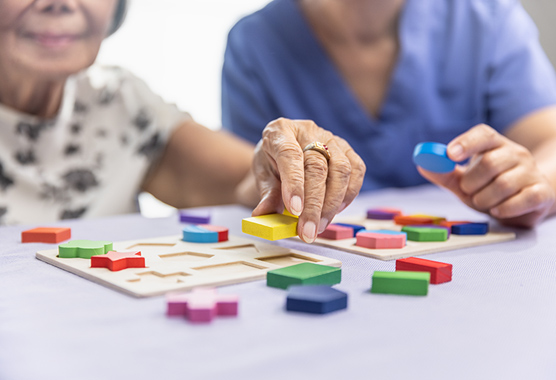Dementia
Dementia can cause symptoms that interfere with your daily life. It can impact your thinking, memory, and social skills. Our compassionate healthy aging experts can help.
Medically reviewed by David Bissig, M.D. on May 24, 2024.

What Is Dementia?
Dementia is a term used to describe the impaired ability to think, remember things, and perform daily activities. Dementia can develop from several types of diseases, most commonly Alzheimer’s disease. These diseases result from abnormal changes in the brain.
The Dementia Care Program at UC Davis Health has expertise in supporting people with dementia and their caregivers. It’s part of our Healthy Aging Clinic which earned national recognition as an Age-Friendly Health System.
Our specialists are leaders in aging patient care. We offer cognitive assessments and care planning. We also offer helpful resources for caregivers.
Types of Dementia
Several different diseases lead to dementia and the development of cognitive symptoms. These diseases are often referred to as types of dementia or thought of as causing dementia:
Alzheimer’s Disease
Alzheimer’s disease is the most common type of dementia. It is associated with abnormal protein buildup causing plaques and tangles to form in the brain and a loss of connection between nerve cells.
Vascular Dementia
This type of dementia is caused by damage to blood vessels in the brain, from a stroke, for instance.
Frontotemporal Dementia
This is a group of diseases that damage nerve cells in the frontal and temporal lobes of the brain. These areas impact your behavior, personality, and language.
Lewy Body Dementia
This is one of the more common types of dementia. It is caused by clumps of a protein building up in neurons and causing injury. Those clumps are called Lewy Bodies. This condition is related to Parkinson's disease.
Dementia Symptoms
The symptoms of dementia can vary greatly from person to person. They also depend on the type of dementia you have and the areas of your brain that are affected.
Common Symptoms
Possible signs of dementia include:
- Memory loss
- Problems speaking or finding words, repeating yourself
- Trouble with reasoning, problem-solving or performing complex tasks
- Confusion and disorientation, such as getting lost
- Acting impulsively
- Issues with balance and movement
- Hallucinations
Risk Factors for Dementia
There are several factors that can increase your risk of dementia, including:
Older Age
Dementia is most common in people 65 and older. After age 65, your risk doubles every five years.
Family History
Having a parent, brother or sister with dementia increases your risk of developing the disease.
Certain Medical Conditions
People with cardiovascular issues, such as high blood pressure, diabetes, and high cholesterol, have an increased risk of dementia. Hearing loss, obstructive sleep apnea, traumatic brain injury (TBI) also raise your risk of dementia.
Diagnosing Dementia
To diagnose dementia, your provider will perform a physical exam, review your medical history, and inquire about your symptoms. If we think you may have dementia, we will order certain tests to assess your brain.
There isn’t one single test that can determine if you have dementia. But we can perform several specific exams to check your:
- Attention
- Memory
- Problem-solving skills
- Other cognitive abilities
Your provider may also order blood tests and brain scans, such as a CT scan or an MRI. These tests help your care team check for evidence of disease-caused dementia.
Treatments for Dementia
Currently, there is no cure for dementia. But there are medications we can prescribe to help manage your symptoms, such as:
Cholinesterase Inhibitors
These medications increase levels of acetylcholine, a chemical messenger associated with memory and judgment. They are primarily used to treat Alzheimer’s disease, but they can also work for other dementias.
Memantine
This drug targets glutamate, another chemical messenger that’s involved with memory and learning.
Other Medications
Your provider may prescribe other medications to help treat symptoms like hallucinations, agitation, depression, and sleep issues.
Preventing Dementia
There is no guaranteed way to prevent dementia. But there are steps you can take to reduce your risk:
Treat High Blood Pressure
High blood pressure may increase your risk of certain types of dementia.
Quit Smoking
Smoking, specifically in middle age and beyond, may increase your risk of dementia.
Stay Healthy
Eating a healthy diet and being physically active may delay the onset of dementia. Aim to exercise for 150 minutes each week.
Give Your Brain a Workout
Doing mentally stimulating activities like puzzles and word games or learning a new language or instrument may delay the onset of dementia and reduce its effects.
In the United States, dementia affects
10%Of adults aged 65 and older
Rates of dementia and mild cognitive impairment rise to
35%In adults aged 90 and older
Source: Columbia University: One in 10 Older Americans Has Dementia
Request an Appointment
As Sacramento's No. 1 hospital, you'll benefit from unique advantages in primary care and specialty care. This includes prevention, diagnosis and treatment options from experts in 150 specialties.
Referring Physicians
To refer a patient, submit an electronic referral form or call.
800-4-UCDAVIS
Patients
Call to make an appointment.
Consumer Resource Center
800-2-UCDAVIS

Ranked among the nation’s best hospitals
A U.S. News & World Report best hospital in cardiology, heart & vascular surgery, diabetes & endocrinology, ENT, geriatrics, neurology & neurosurgery, and pulmonology & lung surgery.

Ranked among the nation’s best children’s hospitals
U.S. News & World Report ranked UC Davis Children’s Hospital among the best in pediatric nephrology, orthopedics*, and pulmonology & lung surgery. (*Together with Shriners Children’s Northern California)

Ranked Sacramento’s #1 hospital
Ranked Sacramento’s #1 hospital by U.S. News, and high-performing in aortic valve surgery, back surgery (spinal fusion), COPD, colon cancer surgery, diabetes, gynecological cancer surgery, heart arrhythmia, heart failure, kidney failure, leukemia, lymphoma & myeloma, lung cancer surgery, pacemaker implantation, pneumonia, prostate cancer surgery, stroke, TAVR, cancer, orthopedics, gastroenterology & GI surgery, and urology.

The nation’s highest nursing honor
UC Davis Medical Center has received Magnet® recognition, the nation’s highest honor for nursing excellence.

World-class cancer care
One of ~59 U.S. cancer centers designated “comprehensive” by the National Cancer Institute.

A leader in health care equality
For the 13th consecutive year, UC Davis Medical Center has been recognized as an LGBTQ+ Healthcare Equality Leader by the educational arm of America’s largest civil rights organization.

